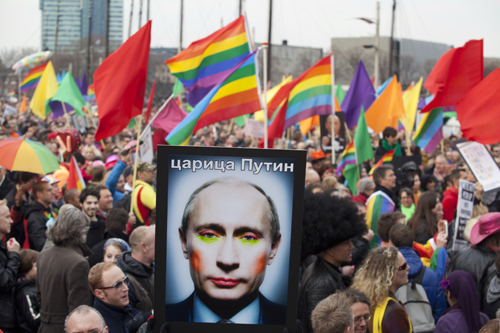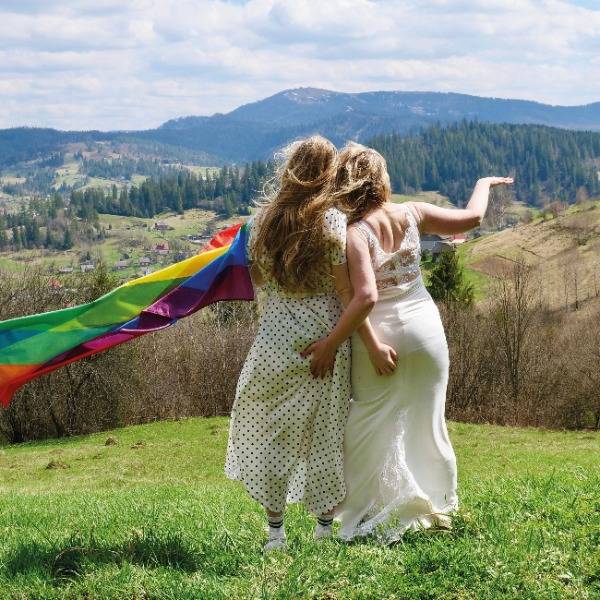
Worrying reports come from Russia, where the newly adopted law, which bans the spreading of "propaganda of non-traditional sexual relations" among minors, seems to have caused a rise in vigilantism from anti-gay groups. The Russian Duma passed the law in June this year. Promoting homosexuality to minors can result in fines up to 100,000 Rubles (£1,900), or even a short jail sentence if the offender is a foreigner. For organisations “spreading gay propaganda”, the punishment can go up to 1,000,000 Rubles (£19,000) and 90-day suspension of operation. Alongside this propaganda ban, the Duma also passed another controversial law, which sets high fines and prison sentences for “offending religious feelings”.
Now that the propaganda ban has come into law, gay-rights activists have reported an increase in homophobic attacks. Some ultranationalist groups set out to lure gay people (who they call paedophiles) into meetings, and then proceed to humiliate, beat and intimidate them. Such actions are commonly also filmed and posted online, both as a warning to other gays and as a trophy for the vigilante gangs. The films show people, often just teenagers, being abused and humiliated, frequently with onlookers encouraging the perpetrators or even joining in. It seems that the gay propaganda ban has emboldened these groups to act more openly; as the state recognises homosexuality as something harmful to children, it is easy to find justification to “hunt down” gays.
There have also been official charges under the new law. In July, 4 Dutch filmmakers, who were filming a documentary of the life of LGBT people of Murmansk, were arrested after speaking at a human rights event about how gay people are treated in the Netherlands. After questioning, they were however released. Last week, Dimitry Isakov, a gay rights activist, was arrested for standing in the centre of central Russian city of Kazan holding a sign saying: “Being gay and loving gays is normal. Beating gays and killing gays is a crime!” He is yet to face trial. As is the case with the newly adopted blasphemy law, the gay propaganda ban is extremely vague. What counts as an offence is left for the authorities to decide, and will no doubt result in some arbitrary charges.
The passing of the law resulted in national and international criticism, with human rights groups calling the current situation in Russia “the worst human rights climate in the post-Soviet era”. The new ban got much attention in the UK when Stephen Fry released an open letter in which he calls for David Cameron and the International Olympic Committee to relocate next year’s Winter Olympics from the southern Russian city of Sochi. The PM did not back such a move, but has said he has deep concern about the abuse gay people face in Russia. Fry later said it was "probably not realistic to call for a move or a boycott at this stage in terms of it achieving its objective", but added that he thinks “it is realistic to call for it and to create moments like this where people think really hard”. The US President Barack Obama also criticised the Russian law: “I have no patience for countries that try to treat gays or lesbians or transgender persons in ways that intimidate them or are harmful to them,” he said during a talkshow appearance. Russian authorities have reassured the IOC that the new law will not interfere with the Olympics, and that “everyone will be welcome in Sochi regardless of their sexual orientation."
Nevertheless, it is fair to say that Russia is not an easy place for LGBT people to call home. Officially, homosexuality was decriminalised in Russia in 1993. However, the new propaganda ban seems to only be the culmination of anti-gay politics in the country. Such bans have existed regionally before, and gay-rights organisations have frequently been denied official registration. The city of Moscow in 2012 banned Gay Pride parades for 100 years, even after having to pay fines to an activist, who took the Russian government to the European Court of Human Rights over previously banned events. Earlier this year, President Putin signed a law which bans Russian children being adopted by same-sex couples, or any couples in countries where marriage equality exists. The Russian Orthodox Church, with its increasingly tight relationship with the Kremlin, has also played a part in the upkeep of anti-gay attitudes. In July, the leader of the Church, Patriarch Kirill, spoke about same-sex marriage: “This is a very dangerous apocalyptic symptom, and we must do everything in our powers to ensure that sin is never sanctioned in Russia by state law.” Later, an Orthodox Christian mob attacked protesters outside the Duma when the anti-propaganda bill was being discussed, throwing eggs and bottles of urine at them.
Anti-gay attitudes are not only held by the Russian authorities. A survey conducted earlier this year found that anti-gay sentiments are more prominent now than they were 8 years ago. Not only are 85% of Russians against same-sex marriage, but 34% think homosexuality is a disease and 22% say gays need compulsory treatment. Five per cent of the people polled thought homosexuals should be eradicated completely. Homosexuality was illegal in the Soviet Union, and somewhat confused with paedophilia, which may account for the common negativity towards gays even today. Now that the law technically bans any positive discussion of homosexuality in schools or other educational settings, it seems unlikely that people’s general attitudes could change in the near future.
Later this week, the G20 summit will take place in St. Petersburg. Russia and President Putin will once again come under the world’s watchful eye. Undoubtedly, Syria will be the most interesting topic to observers, but possible gay-rights protests (and violent arrests that are likely to follow any such event) may increase the likelihood of Putin being publicly criticised for the new legislation. What is more likely though is that no international condemnation will change what is already a law in Russia. Fighting for “traditional values” with such antics as this anti-gay legislation, and the new blasphemy law, tightens Putin and his supporters’ grip on power, and helps in keeping reform-minded dissidents at bay.

